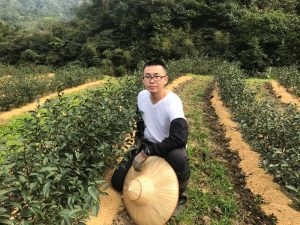Chang-Chih Hsieh, a young farmer, returned to his hometown — Pingxi District of New Taipei City — to plant organic tea four years ago. He used environmental data to manage the tea garden, obtained certification for in-conversion agricultural products, and built the first organic tea garden in Pingxi District.
Chang-Chih Hsieh was born in 1987 and studied in the Department of Irrigation Engineering and the Department of Soil and Water Conservation. After graduation, he engaged in software system development in the science and technology industry. His grandfather had been a miner for a long time and could not work in the tea garden; the garden gradually declined and fell into disrepair. On holiday, he returned to his hometown and saw the tea garden covered with grass and tea-making equipment covered with dust. He was deeply moved and decided to quit his job as an engineer. He returned to Pingxi, his hometown he most missed, and took over his grandfather’s tea garden four years ago.

He had just returned to his hometown with little knowledge of the tea industry. Because the tea trees planted by his grandfather were too old and the quality of the tea produced was poor, he resolutely decided to completely renovate and grow new tea and develop organic tea gardens. In the beginning, the lack of planting experience led to the poor growth of the newly planted Chin-Shin-Oolong tea, but he was not discouraged by this. Through cooperation with Tea Research and Extension Station and schools, he found that the poor growth of tea plants was caused by excessive weeds, pests, and diseases in the tea garden. Through inter-crop weed management and rice husk covering, he reduced weeds’ growth and the impact of weeds on crops. He also made good use of his expertise learned in graduate school and the weather information of the weather station to analyze and observe the temperature data changes and take preventive measures in advance in the climate where insects will lay eggs in large numbers. Because Pingxi is close to the mountains, the rainfall is more abundant than the flat land. The meteorological data makes it possible to prevent the tea plantation from getting too high and prevent diseases from causing the tea trees to get sick. These experiences let Chang-Chih Hsieh understand that running a tea garden is like taking care of his children. Now he regularly sends soil to the tea plant every year to test the nutrient content of the earth, to understand whether there is excess or poor nutrient content, and then adjust the ratio of probiotics and liquid fertilizer to the tea plants; He continued to learn knowledge and technology of Wenshen Paochong tea to make process. Through learning by doing, he quickly accumulated tea-making experience and skills. Finally, he obtained the certification of in-conversion agricultural products last year (2019), becoming the first organic tea garden in Pingxi District. Those who want to taste Chang-Chih Hsieh’s organic Wenshen Paochong tea can buy it at the shop of the Pingxi District Farmers’ Association.
Chang-Chih Hsieh said that in transforming organic tea gardens, he found that the output of organic tea was low and the unit price was too high. He realized that the traditional tea garden was mainly manual tea picking, which led to limited output. Therefore, he plans to expand the planting area in the future and copy his tea garden management method to other farms. Only with a good growth environment can the tea trees be healthier and more vital. Afterward, Hsieh used semi-automatic farming machines to pick tea, effectively improving the output and saving labor costs, maintaining the quality of organic tea. Chang-Chih Hsieh won second place in the “Agricultural Extension Education and Technology Exchange Conference” sponsored by the New Taipei City Farmers’ Association this year(2010). He intends to share his valuable experience with other farmers; he also hopes to take care of the surrounding environment of Pingxi. He hopes the tea garden will be full of vitality in the future so that the tea mountain scenery will attract more young people to return home to serve and inject life into Pingxi through agricultural reform.
Wen Lee, the Commissioner of the Agriculture Department, said that through the leading spirit of “Access to Markets: A Road to Sustainability,” the Department will always be the most substantial support of Young Farmers in New Taipei City. The Agriculture Department will continue to offer resources to guide young farmers and build a service platform with the “New Farm and Fishery Industry Guidance Program” to assist farmers in strengthening business projects such as product processing and development, food and agriculture experience improvement, brand image design, e-commerce marketing, agricultural science, and technology application, and handle new media and related marketing courses. These behaviors and policies can actively assist farmers in opening offline and online channels so that farmers can sell their agricultural products, increase the income of young farmers, drive the development of the local agricultural industry, and combine with tourism resources to create local value and attract more young people and new farmers to join the crew of farmers.
More Information:
Agriculture Department, New Taipei City Government Farm and Fishery Industry Guidance Section Ming-Hsiung Chien / Chief Tel: 2960-3456 * 2902 Mobile: 0926-270-873
